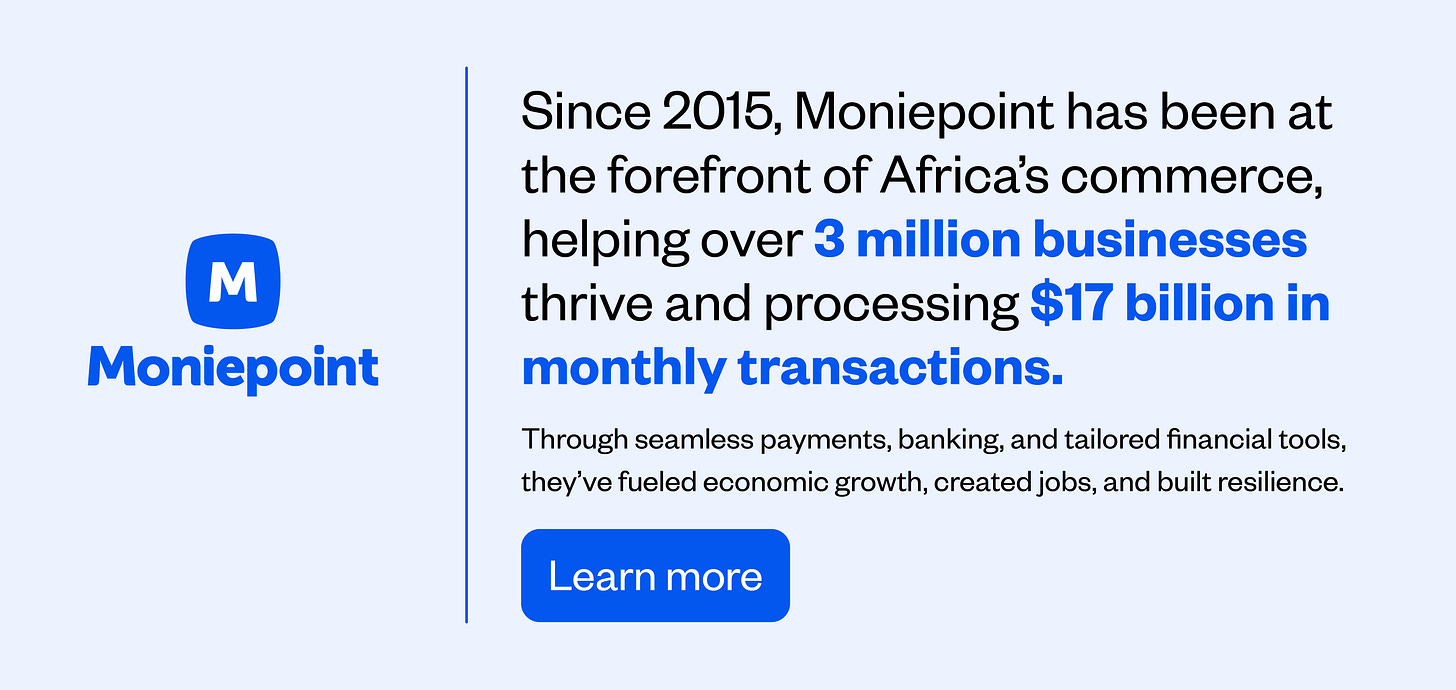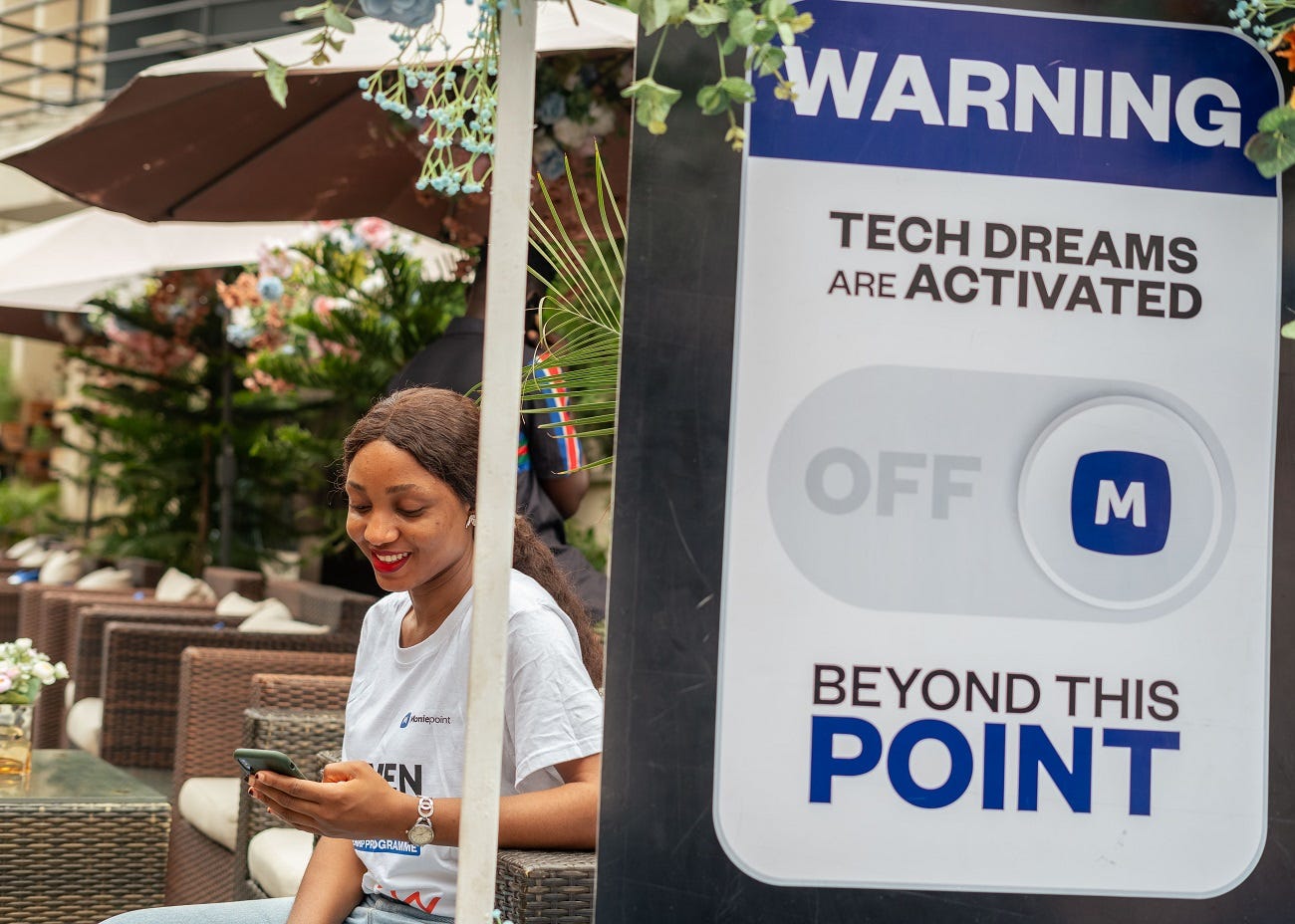Communique 47: How fintech became the poster child of African tech
From powering creative projects and financing films, to building payment infrastructure and developing global talent, fintech’s impact has been far-reaching.
Presented by Moniepoint
1. Chasing unicorns
In October, Nigerian fintech Moniepoint became the latest African tech company to cross the billion-dollar valuation mark, a feat that only eight others have ever accomplished.
Venture capital funding into Africa’s tech ecosystem has slowed down over the last two years, with several startups shutting up shop, laying off staff, or pivoting into nearly unrelated industries. News around Moniepoint’s “unicorn” status was welcome, and even more remarkable was that that company nearly tripled its valuation during a period when the Naira had lost half of its value.
But for several ecosystem stakeholders, this was unsurprising. The fintech sector of the industry had become so prominent that by 2022, it was already competing with larger traditional financial institutions for advertising spend. Fintech startups were pouring millions of dollars into the biggest TV shows, signing the most prominent musicians as brand ambassadors, and splashing the cash on massive billboards around town.
Between 2020 and 2024, for instance, fintech companies were the biggest sponsors of reality TV shows, and reality TV shows have historically attracted the most eyeballs. In 2023, The Black Book, Netflix’s most successful African original film to date, was backed by a roster of fintech founders and investors from companies like Paystack, Flutterwave, and PiggyVest.
Fintech has become the poster child for tech in Africa, an MVP pointing many to what is possible. But its recent rise to the fore dates a few years back, before the boom of 2019.
2. A switch in time
For students of contemporary history, 2002 was an interesting year; the global financial system was reeling from the collapse of Enron the previous year, the International Criminal Court was established to prosecute crimes against humanity, and Brazil won the World Cup. Amidst these exciting developments, something of heroic proportions was happening in Nigeria. Mitchell Elegbe, a young engineer, founded a company that would turn the financial services industry right side up. Within a decade, the company — Interswitch — grew to become a mainstay of the ecosystem, and developed a playbook for what was possible for young people in an otherwise difficult market.
On the other side of the continent, in 2003, Nick Hughes, Vodafone’s head of social enterprise at the time, proposed an idea backed by the U.K.’s Department for International Development to develop technology that allowed mobile phones to execute financial transactions. After four years of iteration and building partnerships, including from Safaricom, the now-famous M-PESA launched in Kenya in 2007. From about 20,000 users one month after launch, the product grew to over 1 million users within seven months. M-PESA has now become the subject of several case studies at the best universities in the world.
Over the next 15 years after M-PESA’s launch, fintech would grow into the cornerstone of Africa’s technology ecosystem, with 205 fintechs attracting 43% of the total funding raised in 2022. But how did this industry become so important and prominent?
3. Hit tracks and payment rails
The mid-1800s marked a new era for the American economy. The need to efficiently transport goods between the east and west coasts had become evident as the acquisition of California and the resolution of the Oregon Dispute between America and Great Britain almost doubled the former’s geographical size. But work did not start on the Pacific Railroad until 1862, during the American Civil War. The railroad was supposed to help maintain communication between the east and the west and, more importantly, facilitate troop and equipment movement for Abraham Lincoln’s union army.
The railroad was completed in 1869, four years after the war ended, and it became the backbone on which the war torn country rebuilt its economy. It drastically reduced travel times for goods across the U.S., eliminating the months-long voyage around South America or across dangerous trails by wagon. It enabled companies across different industries from agriculture to mining to access new markets; raw materials from the less developed West Coast could be sent to the industrialized East Coast, while manufactured goods could be sent back westward. With the help of the railroad, America grew to become an economic world power.
Fintech has done the same in Africa, albeit to much smaller effect.
In Nigeria, for instance, fintech was the railroad on which the tech ecosystem was built. Legacy payment companies like Interswitch and newer players like Paystack and Flutterwave built critical payment infrastructure for thousands of businesses to collect money from their customers. They created a platform for many other startups to expand their product offerings and seek out venture capital. With reliable payment solutions in place, these businesses could focus on growth rather than pesky transaction-related challenges. Other tech sectors like logistics, edtech, healthtech, and e-commerce have also flourished because fintech had already done the thankless job. For instance, PiggyVest, a wealth management platform, was enabled by Paystack’s payment solution; Uber found it easier to deploy its ride hailing services in Nigeria because of Flutterwave’s payments rails; and Netflix and Amazon Prime could spread their tentacles and bill users in Nigeria because of payment infrastructure from local startups.
Fintech companies have also contributed to talent development across the continent. By investing in internships and training programs like the Moniepoint Women In Tech internship, and partnerships with educational institutions like Altschool, these companies have helped create a skilled tech workforce that is good enough to export globally.
But fintech’s most important contribution to the ecosystem has been in exits and liquidity events. In October 2020, when news of Stripe’s acquisition of Paystack broke amidst the EndSARS protest, the immediate effect was that it helped reinforce what the protesters had been saying all along: tech workers were not criminals, and tech was a viable career path. But the long term implications were more profound. The success of these fintechs stoked an entrepreneurial spirit in their employees. “The impression that Paystack has always left on me is that there’s an opportunity for many more things to work. And like you know, the best way to predict the future is to (attempt to) invent it,” Yinka Adewuyi, Paystack-alum and CEO of Golemon, a grocery delivery startup, told Condia.
Many of these employees gained experience in scaling startups, managing investments, and interacting with global investors. They have taken these learnings along to build their own companies, sometimes bootstrapping from the profits they made from the exits of their former employers. Some have even been backed with angel investment from their former bosses.
4. A creative goldrush
The beauty of fintech is that it touches almost everything. In 2022, Flutterwave acquired Disha, a platform that allowed digital creators to create portfolios and receive payments from their audience globally.
Gbenga Agboola, Flutterwave’s CEO, told TechCrunch at the time that the company “saw Disha as an opportunity to capture a new market of indie creators that need innovative tools to showcase their craft and get paid.”
That acquisition hasn’t worked out so far, with Flutterwave temporarily shutting Disha down earlier this year, citing a need to “realign its mission to better serve the creative community.” Unfortunately no specific reopening date has been announced. In its place, however, platforms like Selar, whose founder is a Paystack and Flutterwave alumnus, are integrating fintech solutions to allow creators monetize their work. In 2023, the company paid out over 4 billion naira ($2.4 million) to creators.
Aside from helping creators monetize their work, fintechs have become an important source of funding for the creative economy. In 2020 Flutterwave, crypto exchange Patricia, and neobank Kuda became the first fintech sponsors of reality TV show, Big Brother Naija (BBN), the beginning of a symbiotic relationship that has seen these companies significantly increase their user base as the show airs.
Communiqué 11 explained why Big Brother and other reality TV shows had become important advertising real estate:
“Talking about the shows online generates a ripple effect, attracting more attention and eventually converting interest into viewership. The same holds true for advertising. People see great ads during major TV events, they talk about them online, resulting in more publicity and exposure for the advertised product.”
Flutterwave almost doubled its total transaction value during the period of its first Big Brother Naija sponsorship, leading to a unicorn valuation months after. Other fintechs like Moniepoint and Pocket (formerly known as Abeg) have also sponsored the show.
Fintechs are also becoming prominent in the film industry. In 2023, for instance, The Black Book premiered on Netflix to global critical acclaim and rave reviews. A few days before release, the film’s director Editi Effiong shared a list of investors who backed him, half of the names were prominent fintech founders and investors. That symbolized a moment for fintech’s foray into the creative economy. According to Odunayo Eweniyi, PiggyVest co-founder and one of The Black Book’s investors, “The tech industry in Nigeria is burgeoning, and collaborations between tech and the entertainment industry, particularly Nollywood, will open up new levels of content creation, distribution, consumption, and most importantly, quality.”
The past has so far been encouraging, and the future looks even more promising.








This was a great read. Thanks for taking out time to do the research to make it Insightful.